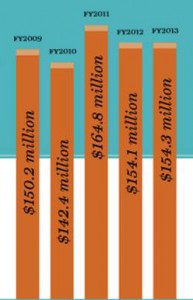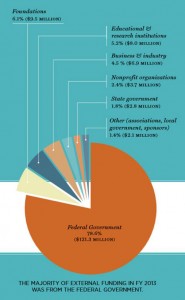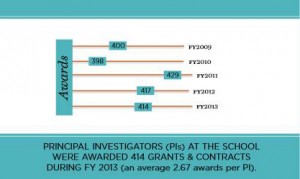Fiscal Year 2013 Research Annual Report
December 2, 2013
Those of us at the Gillings School of Global Public Health are proud to call North Carolina home. Our faculty, staff members and students conduct meaningful research in our state and around the world. This year, faculty members were awarded 414 grants and contracts totaling more than $154.3 million. During the past year, 46 percent of these projects, totaling $43 million, provided a community benefit to people who live in N.C. Moreover, the research provided an economic benefit to the state, as the grant and contract dollars were spent in every county and created another 5,500 jobs.
All eight academic units at the School focus on solving N.C.’s pressing public health problems — preventing obesity, protecting drinking water, preparing for natural and human-caused disasters, and reducing disparities in health outcomes, among others. The map below identifies research taking place in each of our 100 counties. At tinyurl.com/NC-map-RENCI, click on any county to see our projects there.
 Examples of our research are described in this issue. I’ll share a few others with you here:
Examples of our research are described in this issue. I’ll share a few others with you here:
Jason Surratt, PhD, ESE assistant professor, was funded by the U.S. EPA to study the unique role played by trees and vegetation in increasing air pollution in N.C. His work, which examines isoprene, a naturally occurring air pollutant, will shed light on the effects of our air on human health and may provide policy makers with data needed to inform important legislation. Surratt, recently honored with a prestigious AAAR award (see more), was featured in the spring 2013 issue of Carolina Public Health (sph.unc.edu/cph).

Gillings School faculty members were awarded $154.3 million for grants and contracts in fiscal year 2013.
The Robert Wood Johnson Foundation funded an interdisciplinary team to examine impact of the economic recession on N.C.’s local health departments, with particular attention to how financial cuts affect the health of North Carolinians. Early analyses reveal that, during the study period (2005 – 2008), there was great variation in counties’ per-capita expenditures, with 15 percent of studied counties experiencing a decrease. Future analyses will determine associations between expenditure levels and the health of the community. Team members included Anna Schenck, PhD, the School’s associate dean for practice and director of its Public Health Leadership Program and N.C. Institute for Public Health (NCIPH); Anne-Marie Meyer, PhD, research assistant professor of epidemiology and facility director at UNC Lineberger Comprehensive Cancer Center’s Integrated Cancer Information and Surveillance System (ICISS ); William Carpenter, PhD, associate professor of health policy and management and ICISS faculty director; Dorothy Cilenti, DrPH , clinical assistant professor of maternal and child health and NCIPH senior investigator; and Tzy-Mey (May) Kuo, PhD, senior statistical analyst for ICISS . Additional information about this project is available at sph.unc.edu/nciph_ROI_brief.
 Kurt Ribisl, PhD, professor, James Bowling, PhD, research associate professor, and Heathe Luz Reyes, PhD, research assistant professor, all in the Department of Health Behavior, are working on a five-year study funded by the National Cancer Institute to evaluate impact of the 2009 federal Family Smoking Prevention and Tobacco Control Act. The law dramatically changes marketing and sale of tobacco products in N.C. and throughout the U.S. Extensive surveillance, training and analysis are needed to help state and local governments implement new federal regulation on tobacco control. Now, a companion study in England with collaborators from University of Cambridge will describe retail environments and monitor compliance with tobacco and alcohol control policies in the U.K.
Kurt Ribisl, PhD, professor, James Bowling, PhD, research associate professor, and Heathe Luz Reyes, PhD, research assistant professor, all in the Department of Health Behavior, are working on a five-year study funded by the National Cancer Institute to evaluate impact of the 2009 federal Family Smoking Prevention and Tobacco Control Act. The law dramatically changes marketing and sale of tobacco products in N.C. and throughout the U.S. Extensive surveillance, training and analysis are needed to help state and local governments implement new federal regulation on tobacco control. Now, a companion study in England with collaborators from University of Cambridge will describe retail environments and monitor compliance with tobacco and alcohol control policies in the U.K.
 Andy Olshan, PhD, professor and chair of epidemiology, Amy Herring, ScD, professor of biostatistics, and Arthur Aylsworth, MD, professor and chief of the Division of Pediatrics, Genetics and Metabolism in UNC ’s School of Medicine, were funded by the U.S. Centers for Disease Control and Prevention for work with the N.C. Center for Birth Defects Research and Prevention (NCCBDRP). NCCBDRP researchers aim to understand environmental and genetic causes of birth defects. Project personnel are interviewing mothers of 400 children in N.C. — 300 with birth defects and 100 without. They also are collecting genetic data from the parents and children to investigate occupational, environmental, lifestyle and genetic factors in birth defects etiology.
Andy Olshan, PhD, professor and chair of epidemiology, Amy Herring, ScD, professor of biostatistics, and Arthur Aylsworth, MD, professor and chief of the Division of Pediatrics, Genetics and Metabolism in UNC ’s School of Medicine, were funded by the U.S. Centers for Disease Control and Prevention for work with the N.C. Center for Birth Defects Research and Prevention (NCCBDRP). NCCBDRP researchers aim to understand environmental and genetic causes of birth defects. Project personnel are interviewing mothers of 400 children in N.C. — 300 with birth defects and 100 without. They also are collecting genetic data from the parents and children to investigate occupational, environmental, lifestyle and genetic factors in birth defects etiology.
Our Gillings School researchers are devoted to improving the health of North Carolinians. Our reach is global, but we never forget our commitment and responsibility to neighbors right here at home.
Carolina Public Health is a publication of the University of North Carolina at Chapel Hill Gillings School of Global Public Health. To view previous issues, please visit sph.unc.edu/cph.

